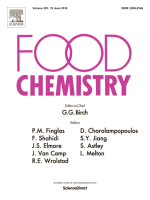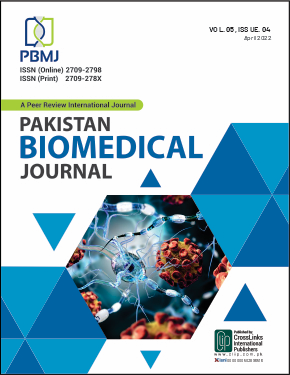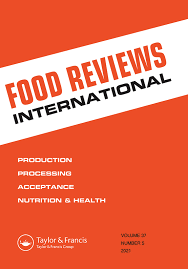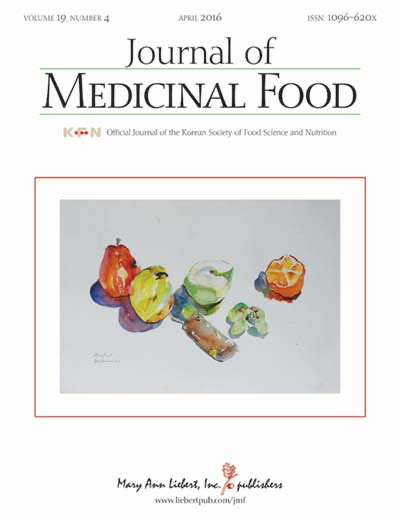Sesame
How to submit an article:
- Registered users can submit any published journal article that has a unique DOI (Digital Object Identifier) name or link to Research Hub.
- For example, you can paste the full DOI link:
https://doi.org/10.1109/5.771073or just the DOI name:10.1109/5.771073into the field above and click submit. - The person who is first to submit a valid article to Research Hub will forever be credited for it, and every article submission earns you +6 Research Points.
Sub-Topics:
Published research studies are articles that present the findings of original research that has undergone a peer-review process and has been made publicly available in scholarly journals, books or other media.

Food and nutraceutical functions of sesame oil: An underutilized crop for nutritional and health benefits
2022 Sep Food Chemistry Langyan S, Yadava P, Sharma S, Gupta NC, Bansal R, Yadav R, et al.
Sesame oil, despite being an under-utilized minor crop, is rich in nutrients such as lignans, tocopherols, phytosterols, natural antioxidants, and bioactive compounds. The review underscores its various health benefits, including anti-lipogenic, hypo-cholesterolemic, anti-degenerative, and neural health-promoting properties. The study emphasizes the need for more research to explore sesame oil's food and nutraceutical potential, positioning it as a valuable candidate for maintaining diversity in food oils and improving human health.
Theoretical Article Review Article Sesame OilNutritional and Therapeutic Potential of Sesame Seeds
2022 Apr 22 Journal of Food Quality Abbas S, Sharif MK, Sibt-e-Abbas M, Fikre Teferra T, Sultan MT, Anwar MJ
The study concludes that sesame seeds and oil have significant potential in the pharmaceuticals, nutraceuticals, and food industries, particularly in snack production.
Review Article Sesame seeds Nutrition Sesame
Hypolipidemic effect of Sesame Seed Oil: A Review
2022 Apr 30 Pakistan BioMedical Journal Arshad M, Ashfaq M, Rizwan B, Zanib R, Fatima A, Pervaiz R, et al.
Sesame seed oil and its derivatives have shown to be highly effective in managing hyperlipidemia and dyslipidemia due to their lipid ameliorating and anti-oxidative effects.
Experimental Study Review Article Cholesterol Sesame Oil Hypercholesterolemia
Consumption of sesame seeds and sesame products has favorable effects on blood glucose levels but not on insulin resistance: A systematic review and meta‐analysis of controlled clinical trials
2022 Jan 18 Phytotherapy Research Sohouli MH, Haghshenas N, Hernández‐Ruiz , Shidfar F
Systematic Review Meta-Analysis Blood Sugar SesameConsumption of sesame seeds and its products positively influences human glucose metabolism, potentially making it a beneficial addition to glucose-lowering diets.

Sesame Seed and Its Fractions for Improving Oxidative Stress in Adults: A Systematic Review and Meta-analysis of Controlled Clinical Trials
2019 Nov 06 Food Reviews International Moghtaderi F, Ramezani-Jolfaie N, Raeisi-Dehkordi H, Salehi-Abargouei A
Systematic Review Meta-Analysis Antioxidant Oxidative StressSesame consumption significantly increases enzymatic (superoxide dismutase, glutathione peroxidase, catalase) and non-enzymatic (vitamin C, vitamin E, β-carotene, and glutathione) antioxidants.
Research insights are moderated by the Research Hub team and offer an at-a-glance overview of interesting research findings.

2022 Phytotherapy Research
Consumption of sesame seeds and its products positively influences human glucose metabolism, potentially making it a beneficial addition to glucose-lowering diets.
Systematic Review Blood Sugar
Consumption of sesame seeds and sesame products has favorable effects on blood glucose levels but not on insulin resistance: A systematic review and meta‐analysis of controlled clinical trials
Sohouli MH, Haghshenas N, Hernández‐Ruiz , Shidfar F

2019 Food Reviews International
Sesame consumption significantly increases enzymatic (superoxide dismutase, glutathione peroxidase, catalase) and non-enzymatic (vitamin C, vitamin E, β-carotene, and glutathione) antioxidants.
Systematic Review Antioxidant Oxidative Stress
Sesame Seed and Its Fractions for Improving Oxidative Stress in Adults: A Systematic Review and Meta-analysis of Controlled Clinical Trials
Moghtaderi F, Ramezani-Jolfaie N, Raeisi-Dehkordi H, Salehi-Abargouei A

2018 Journal of Functional Foods
Sesame oil intake was associated with reduced body weight and body mass index.
Systematic Review Sesame Oil
Do sesame seed and its products affect body weight and composition? A systematic review and meta-analysis of controlled clinical trials
Raeisi-Dehkordi H, Mohammadi M, Moghtaderi F, Salehi-Abargouei A

2018 Molecules
The biomarkers that were significantly different between black seeds and white sesame seeds are highly related to the functions recorded in traditional Chinese medicine.
Systematic Review
Identification of Nutritional Components in Black Sesame Determined by Widely Targeted Metabolomics and Traditional Chinese Medicines
Wang D, Zhang L, Huang X, Wang X, Yang R, Mao J, et al.

2017 Critical Reviews in Food Science and Nutrition
Of the 7 clinical trials included, five evaluating individuals with hypertension observed a significant reduction in systolic and/or diastolic blood pressure. The two articles that evaluated individuals with dyslipidemia showed improvement in lipid profile.
Systematic Review Cholesterol High Blood Pressure
The effect of dietary intake of sesame (Sesamumindicum L.) derivatives related to the lipid profile and blood pressure: A systematic review
Carolina Alves Cardoso, Gláucia Maria Moraes de Oliveira, Luciana de Almeida Vittori Gouveia, Annie Seixas Bello Moreira & Glorimar Rosa
Review Articles
Review articles summarise and critically evaluate the current state of research on a specific topic or field by synthesising multiple primary research studies.

Food and nutraceutical functions of sesame oil: An underutilized crop for nutritional and health benefits
2022 Sep Food Chemistry Langyan S, Yadava P, Sharma S, Gupta NC, Bansal R, Yadav R, et al.
Sesame oil, despite being an under-utilized minor crop, is rich in nutrients such as lignans, tocopherols, phytosterols, natural antioxidants, and bioactive compounds. The review underscores its various health benefits, including anti-lipogenic, hypo-cholesterolemic, anti-degenerative, and neural health-promoting properties. The study emphasizes the need for more research to explore sesame oil's food and nutraceutical potential, positioning it as a valuable candidate for maintaining diversity in food oils and improving human health.
Theoretical Article Review Article Sesame OilNutritional and Therapeutic Potential of Sesame Seeds
2022 Apr 22 Journal of Food Quality Abbas S, Sharif MK, Sibt-e-Abbas M, Fikre Teferra T, Sultan MT, Anwar MJ
The study concludes that sesame seeds and oil have significant potential in the pharmaceuticals, nutraceuticals, and food industries, particularly in snack production.
Review Article Sesame seeds Nutrition Sesame
Hypolipidemic effect of Sesame Seed Oil: A Review
2022 Apr 30 Pakistan BioMedical Journal Arshad M, Ashfaq M, Rizwan B, Zanib R, Fatima A, Pervaiz R, et al.
Sesame seed oil and its derivatives have shown to be highly effective in managing hyperlipidemia and dyslipidemia due to their lipid ameliorating and anti-oxidative effects.
Experimental Study Review Article Cholesterol Sesame Oil Hypercholesterolemia
Consumption of sesame seeds and sesame products has favorable effects on blood glucose levels but not on insulin resistance: A systematic review and meta‐analysis of controlled clinical trials
2022 Jan 18 Phytotherapy Research Sohouli MH, Haghshenas N, Hernández‐Ruiz , Shidfar F
Systematic Review Meta-Analysis Blood Sugar SesameConsumption of sesame seeds and its products positively influences human glucose metabolism, potentially making it a beneficial addition to glucose-lowering diets.

Sesame Seed and Its Fractions for Improving Oxidative Stress in Adults: A Systematic Review and Meta-analysis of Controlled Clinical Trials
2019 Nov 06 Food Reviews International Moghtaderi F, Ramezani-Jolfaie N, Raeisi-Dehkordi H, Salehi-Abargouei A
Systematic Review Meta-Analysis Antioxidant Oxidative StressSesame consumption significantly increases enzymatic (superoxide dismutase, glutathione peroxidase, catalase) and non-enzymatic (vitamin C, vitamin E, β-carotene, and glutathione) antioxidants.
Clinical Trials
Clinical trials are research studies that involve people and are conducted to evaluate the safety and efficacy of new treatments or interventions, such as drugs, medical devices, or behavioural therapies.
Study Protocols
Published study protocols are detailed plans that outline the objectives, methodology, statistical analyses, and organisation of a research study that have been made publicly available for others to review and use as a reference.
Presentation Slides

Systematic Review
Consumption of sesame seeds and its products positively influences human glucose metabolism, potentially making it a beneficial addition to glucose-lowering diets.
Sohouli MH, Haghshenas N, Hernández‐Ruiz , Shidfar F

Systematic Review
Sesame consumption significantly increases enzymatic (superoxide dismutase, glutathione peroxidase, catalase) and non-enzymatic (vitamin C, vitamin E, β-carotene, and glutathione) antioxidants.
Moghtaderi F, Ramezani-Jolfaie N, Raeisi-Dehkordi H, Salehi-Abargouei A

Systematic Review
Sesame oil intake was associated with reduced body weight and body mass index.
Raeisi-Dehkordi H, Mohammadi M, Moghtaderi F, Salehi-Abargouei A

Systematic Review
The biomarkers that were significantly different between black seeds and white sesame seeds are highly related to the functions recorded in traditional Chinese medicine.
Wang D, Zhang L, Huang X, Wang X, Yang R, Mao J, Wang X, Wang X, Zhang Q, Li P.

Systematic Review
Of the 7 clinical trials included, five evaluating individuals with hypertension observed a significant reduction in systolic and/or diastolic blood pressure. The two articles that evaluated individuals with dyslipidemia showed improvement in lipid profile.
Carolina Alves Cardoso, Gláucia Maria Moraes de Oliveira, Luciana de Almeida Vittori Gouveia, Annie Seixas Bello Moreira & Glorimar Rosa

Systematic Review
The studies assessed showed that sesame could have a significant effect on oxidative stress and the antioxidant defense system, being considered a food with an important antioxidant function in the different populations studied.
Gouveia Lde A, Cardoso CA, de Oliveira GM, Rosa G, Moreira AS.

Systematic Review
These results suggest the possible antihypertensive effects of black sesame meal on improving antioxidant status and decreasing oxidant stress.
Wichitsranoi, J., Weerapreeyakul, N., Boonsiri, P. et al.
Executive Summary
Write an executive summary in the form of a blog article on the topic of "Research into Chinese medicine treatment for Sesame" summarising the research below and using language that can be easily understood by patients and avoiding medical jargon using a professional and caring tone of voice.
Write an executive summary in the form of a blog article on the topic of "Researched Chinese medicine treatments for Sesame" summarising the research below in an objective and easy to understand way, and using language that can be easily understood by patients. Group the article into Chinese medicine treatments first, followed by nutrition and other treatments. Avoid using medical jargon and use a professional and caring tone of voice.
Write me a concise but easy to understand executive summary on the topic of "Chinese medicine treatments for Sesame" based on the following research that I will give you. Your summary should be 2 paragraphs long in Australian English spelling and include references to the studies.
A Systematic Review published in 2022 in the journal Phytotherapy Research found that Consumption of sesame seeds and its products positively influences human glucose metabolism, potentially making it a beneficial addition to glucose-lowering diets. The methodology involved conducting a systematic review and meta-analysis on the effect of sesame seeds consumption on blood glucose and insulin resistance in adults. The researchers gathered data from recognized academic resources like PubMed/MEDLINE, SCOPUS, Web of Science, Google Scholar, and EMBASE, which included controlled clinical trials up until February 2021. The sesame products in these trials ranged from sesame oil, sesamin, and tahini, with the intervention period lasting from 45 days to 9 weeks. The results illustrate that the intake of sesame and its products significantly improved fasting blood glucose and Hemoglobin A1c levels. Nonetheless, the results regarding fasting serum insulin and the homeostatic model assessment for insulin resistance were not found to have any significant relation. Hence, the consumption of sesame might be a beneficial supplement for managing glucose levels in humans.
A Systematic Review published in 2019 in the journal Food Reviews International found that Sesame consumption significantly increases enzymatic (superoxide dismutase, glutathione peroxidase, catalase) and non-enzymatic (vitamin C, vitamin E, β-carotene, and glutathione) antioxidants. Meta-analyses revealed that sesame consumption significantly increases enzymatic (superoxide dismutase, glutathione peroxidase, catalase) and non-enzymatic (vitamin C, vitamin E, β-carotene, and glutathione) antioxidants. However, no significant effect was observed on malondialdehyde (MDA), total antioxidant capacity and α-tocopherol levels. It was shown that MDA levels significantly decreases only when sesame seeds were used for supplementation. Sesame consumption is associated with improved oxidative status. High quality randomized controlled clinical trials from diverse regions are still needed.
A Systematic Review published in 2018 in the journal Journal of Functional Foods found that Sesame oil intake was associated with reduced body weight and body mass index. A number of studies suggested that sesame products improve body weight and composition. This was the first meta-analysis of the effect of sesame on body weight and composition. Ten controlled clinical trials were eligible to be included in the systematic review. Sesame supplementation improved body fat percent and body adiposity index. Sesame oil intake was associated with reduced body weight and body mass index. Sesame consumption did not affect other indices of body composition.
A Systematic Review published in 2018 in the journal Molecules found that The biomarkers that were significantly different between black seeds and white sesame seeds are highly related to the functions recorded in traditional Chinese medicine. Chemical composition of secondary metabolites is of great importance for quality control of agricultural products. Black sesame seeds are significantly more expensive than white sesame seeds, because it is thought that black sesame seeds are more beneficial to human health than white sesame seeds. However, the differences in nutrient composition between black sesame seeds and white sesame seeds are still unknown. The current study examined the levels of different metabolites in black and white sesame seeds via the use of a novel metabolomics strategy. Using widely targeted metabolomics data, we obtained the structure and content of 557 metabolites, out of which 217 metabolites were identified, and discovered 30 metabolic pathways activated by the secondary metabolites in both black and white sesame seeds. Our results demonstrated that the main pathways that were differentially activated included: phenylpropanoid biosynthesis, tyrosine metabolism, and riboflavin metabolism. More importantly, the biomarkers that were significantly different between black seeds and white sesame seeds are highly related to the functions recorded in traditional Chinese medicine. The results of this study may serve as a new theoretical reference for breeding experts to promote the genetic improvement of sesame seeds, and therefore the cultivation of higher quality sesame varieties.
A Systematic Review published in 2017 in the journal Critical Reviews in Food Science and Nutrition found that Of the 7 clinical trials included, five evaluating individuals with hypertension observed a significant reduction in systolic and/or diastolic blood pressure. The two articles that evaluated individuals with dyslipidemia showed improvement in lipid profile. The mechanisms of action are still being studied. Regarding the bias risk analysis, clinical trials included showed few descriptions of the methods applied. There are few studies about sesame ingestion, and it was observed high risk for bias in the selected studies. More standardized methods with attention to the design of studies are needed to improve the level of the evidence.
A Systematic Review published in 2016 in the journal Journal of Medicinal Food found that The studies assessed showed that sesame could have a significant effect on oxidative stress and the antioxidant defense system, being considered a food with an important antioxidant function in the different populations studied. In conclusion, despite the limitations and biases of this systematic review, the studies assessed showed that sesame could have a significant effect on oxidative stress and the antioxidant defense system, being considered a food with an important antioxidant function in the different populations studied (individuals with dyslipidemia, diabetes, and hypertension), as well as in its different presentations (oil, seed flour, and capsule). However, better-controlled studies still lack to assess the positive effects on different populations. There are few clinical trials assessing the effect of sesame on oxidative stress. The studies included in this review, mainly those with sesame oil and black sesame meal capsules administered to hypertensive and prehypertensive populations, respectively, showed an increase in enzymatic (SOD, GSH, GPx, and CAT) and nonenzymatic antioxidants (vitamin C, vitamin E, and beta-carotene), as well as a reduction in oxidative stress markers (TBARS and MDA). Although several studies have reported that the exact mechanisms of oxidative stress reduction remain to be fully explained, this review showed that sesame can have a significant positive impact on the health of different popula- tions.
A Systematic Review published in 2011 in the journal Nutrition Journal found that These results suggest the possible antihypertensive effects of black sesame meal on improving antioxidant status and decreasing oxidant stress. This study suggests a beneficial effect of dietary black sesame meal on a reduction in blood pressure in pre-hypertensive humans. It is likely that the antihypertensive effect is due to decreased oxidative stress. Taken together with the absence of side effects and inexpensive preparation, the regular ingestion of dietary black sesame meal may be beneficial for CVD prevention in individuals with prehypertension, or even those with hypertension. A future study that investigates this advantageous effect is suggested.
Moderation Tools
Topic
Sign In
Users not signed in are limited to viewing the 5 most recent items of content.